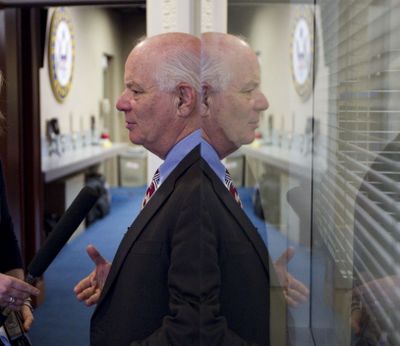Five Republicans help send measure to final floor vote
Brown of Massachusetts breaks with GOP leaders

WASHINGTON – A bipartisan jobs bill cleared a GOP filibuster on Monday with critical momentum provided by the Senate’s newest Republican, Scott Brown of Massachusetts.
The 62-30 tally to advance the measure to a final vote on Wednesday gives both President Barack Obama and Capitol Hill Democrats a much-needed victory – even though the measure in question is likely to have only a modest boost on hiring.
Brown and four other Republicans broke with GOP leaders to advance the measure. Most other Republicans opposed the bill because Democratic Majority Leader Harry Reid of Nevada stripped out provisions they had sought and wouldn’t allow them to try to restore them.
The bill featured four provisions that enjoyed sweeping bipartisan support, including a measure exempting businesses hiring the unemployed from Social Security payroll taxes through December and giving them another $1,000 credit if new workers stay on the job a full year.
Though employers seldom make hiring decisions based on tax breaks, economist Mark Zandi says the measure could potentially create 250,000 new private-sector jobs. That’s less than 4 percent of the 8.4 million jobs lost in the recession.
Joining Brown in voting to break the filibuster were two moderate New England Republicans, Sens. Olympia Snowe and Susan Collins of Maine, and two retiring GOP senators, Kit Bond of Missouri and George Voinovich of Ohio. Democrat Ben Nelson of Nebraska voted “nay” and Frank Lautenberg, D-N.J., was absent.
Reid’s bill is a far smaller measure than Obama’s $862 billion economic stimulus bill enacted a year ago. It’s also significantly smaller than a rival bipartisan bill unveiled earlier this month by two senior senators.
The legislation also would renew highway programs through December and deposit $20 billion in the highway trust fund.
“I came to Washington to be an independent voice, to put politics aside and to do everything in my power to help create jobs for Massachusetts families,” said Brown, whose election last month gave Republicans the 41st vote that could sustain GOP filibusters. “This Senate jobs bill is not perfect … but I voted for it because it contains measures that will help put people back to work.”
Voinovich said he voted for the bill because the highway spending will create jobs and help states pay for important projects.
“If we don’t do this we’re going to miss the construction season, and this is an area where you absolutely create jobs,” Voinovich said.
Republicans and some Democrats were unhappy that Reid abruptly dumped about $70 billion worth of tax breaks for businesses and individuals, help for the unemployed and additional Medicare payments to doctors from a compromise measure unveiled earlier this month by Sens. Max Baucus, D-Mont., and Charles Grassley, R-Iowa, the chairman and ranking Republican on the Finance Committee.